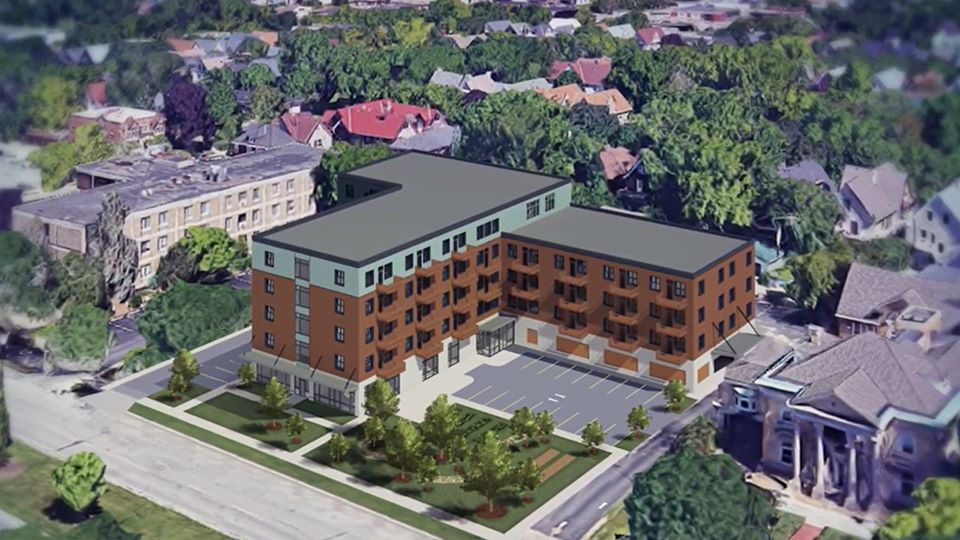Near West Side project to feature affordable units integrating people with disabilities with seniors
The Wisconsin Housing and Economic Development Authority (WHEDA) has announced that AbleLight Village-Highland is among the projects to receive tax credits for 2021. The project would bring much-needed affordable housing to Milwaukee’s Near West Side, serving both people with intellectual and developmental disabilities (I/DD) and active seniors.
“We are incredibly grateful for the confidence WHEDA has shown in AbleLight Village,” said Mike Thirtle, President and CEO of Bethesda. “Working alongside supportive community partners, we will lead the way in creating a caring and inclusive community that empowers people of all abilities to live lives of independence and promise. We cannot wait to open our doors to positively impact the Near West Side neighborhood and foster community.”
AbleLight Village-Highland will be located at 3200 W. Highland Blvd., currently home to Aurora Family Service. Advocate Aurora Health is generously donating the property for the project. Up to 20% of the units in this 68 apartment home community will be set aside for people with I/DD, and 10 of them will be reserved for those who are at risk of homelessness. Most of the units will be rented at affordable rates.
In addition, the Milwaukee Center for Independence is anticipated to provide community-based services such as benefits advocacy, employment and skills training, case management, and art, music, pet and horticultural therapy. Bethesda engaged Milwaukee-based Quorum Architects Inc. to create plans for the new living space. Cardinal Capital Management is also partnering with Bethesda on the project, which is expected to begin construction work later this year.
Launched in Minnesota
AbleLight Village integrates people with disabilities with individuals of all abilities, with the first development opening last September in Victoria, Minn. Each AbleLight Village provides not only a high-quality physical space, but also fosters social connections and community among residents and with neighbors through rich resident life activities.
Similar to the development in Minnesota, AbleLight Village-Highland will include ample common spaces – a multiple purpose community room with a kitchen, fitness center, reading and technology lounge, common patio and an outdoor play area. To bring these spaces to life, a director of activities will be on staff to create and customize events and classes that appeal to the personality of the community. Events may include yoga and exercise classes, coffee hours, book clubs, bible studies, cooking demonstrations, education presentations and group trips to nearby attractions.
“AbleLight Village is really an entirely new living option, one that makes it possible for people of all abilities to enjoy truly joyful living,” Thirtle said. “This is the quality of life that the people of the Near West Side rightfully deserve.”
The project will also help meet a significant need for housing. According to The ARC, more than 850,000 people in the U.S. with intellectual or developmental disabilities live with an aging caregiver (60+). A shortage of housing and support services increases the risk that these individuals will become institutionalized or homeless.
In addition, affordability is an ongoing issue. According to the Technical Assistance Collaborative, in 2016 there was no housing market in the U.S. where a person with a disability whose sole source of income was SSI could afford a safe, decent rental unit. There are 4.8 million people with disabilities in the U.S. living only on SSI.
WHEDA support is critical
Each year, WHEDA allocates affordable housing tax credits through the federal Internal Revenue Code and the Wisconsin tax code that encourage developers to create qualified affordable housing. Developers agree to reserve all or a portion of their housing units for low- and moderate-income households for at least 30 years in exchange for credits. Any remaining units are rented at market rates. The developers then sell the tax credits to private investors to obtain funding. Once the housing project is available to residents, investors can claim the tax credit as a dollar-for-dollar reduction of federal and/or Wisconsin income taxes owed over a 10-year period.
Developments that receive affordable housing tax credits go through a highly competitive application process administered by WHEDA. Tax credit developments must meet high design and operating standards. WHEDA judges projects based on strong management, excellent development quality, demonstrated market need, provision of supportive services and amenities, proximity to economic opportunities and proper local zoning.
Besides the Highland project, Bethesda is pursuing additional developments across the country, including in Wisconsin, Minnesota and California.

